
Certain storage and screening requirements have been established to balance the need to store these items with the need to reduce the aesthetic impacts of such storage on surrounding properties.
Residential Storage and Screening of Recreational Vehicles (RV), Watercraft and Trailers
This information pertains to Land Use Code 20.20.720 for codes applicable to all areas in Bellevue.
Can an RV, boat, or utility trailer be stored on a residential lot?
Parking or storage of recreational vehicles, watercraft (whether mounted on trailers or un-mounted), or utility trailers is permitted in a residential (R-1 – R-30) land use district.
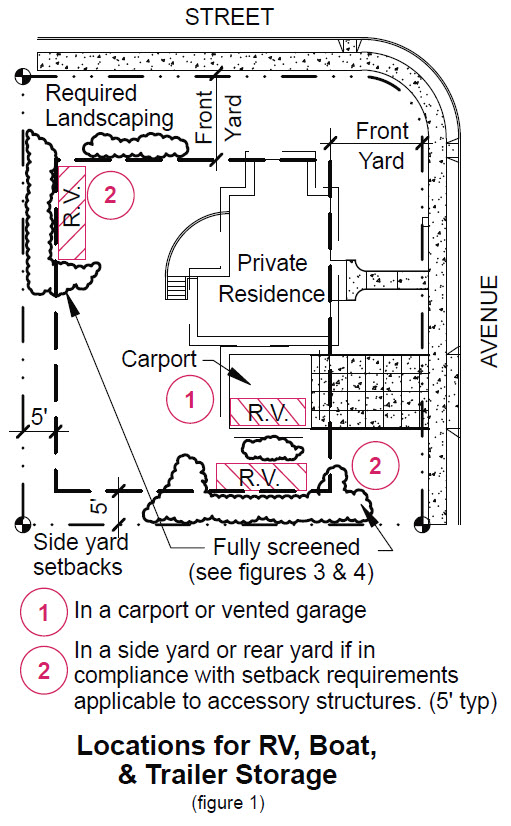
What is considered a recreational vehicle?
Any wheeled, motorized vehicle manufactured, converted or altered to provide self-contained temporary living quarters for recreational, camping or travel uses and which does not exceed 40 feet in length. Any vehicle manufactured, converted or altered which has integral wheels for towing or can be mounted on a motorized vehicle to provide self-contained, temporary living quarters for recreational, camping or travel uses.
What is considered a watercraft?
Any vessel used for water travel, sport or pleasure which is greater than 12 feet in length but does not exceed 40’feet in length or 12 feet in height, as measured at the highest point when mounted on a trailer.
What is considered a utility trailer?
Any vehicle with integral wheels designed to be towed by a motorized vehicle to transport goods, property, equipment or livestock.
Are canoes and kayaks considered watercraft?
They are watercraft. They are not required to be sight-screened from abutting properties if they are less than 12 feet in length.
Is there a maximum size limit?
Yes. An RV, watercraft or utility trailer over 40 feet in length is not permitted in any residential land use district.
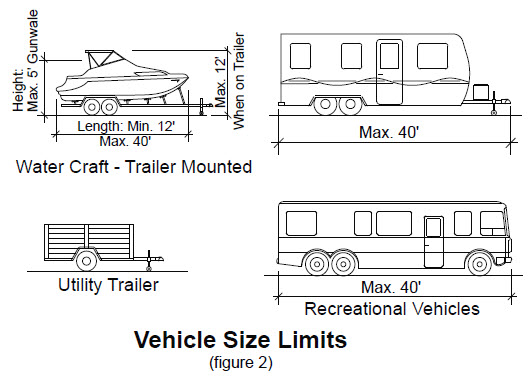
Where can these be stored, and what screening must be provided?
The easiest ways to store these are as follows:
- In a vented garage
- In a carport, provided it is screened by solid board fencing or sight-obscuring landscaping at least six feet in height
- In a side or rear yard, provided it meets setback requirements applicable to accessory structures (typically 5 feet) and is screened by solid board fencing or sight-obscuring landscaping at least six feet in height
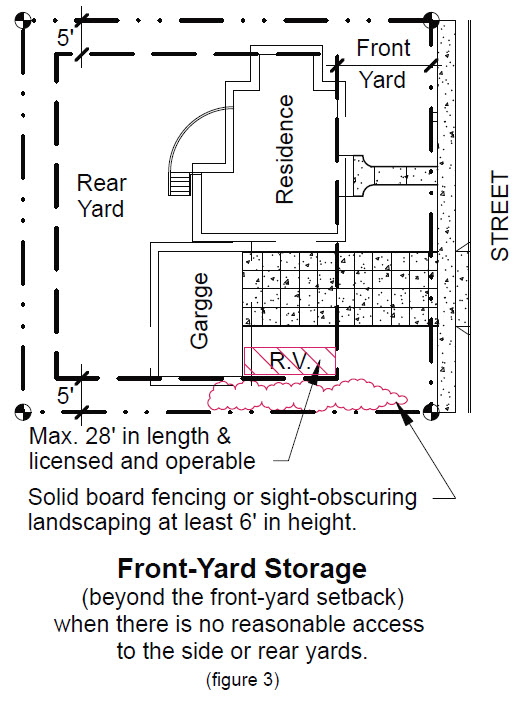
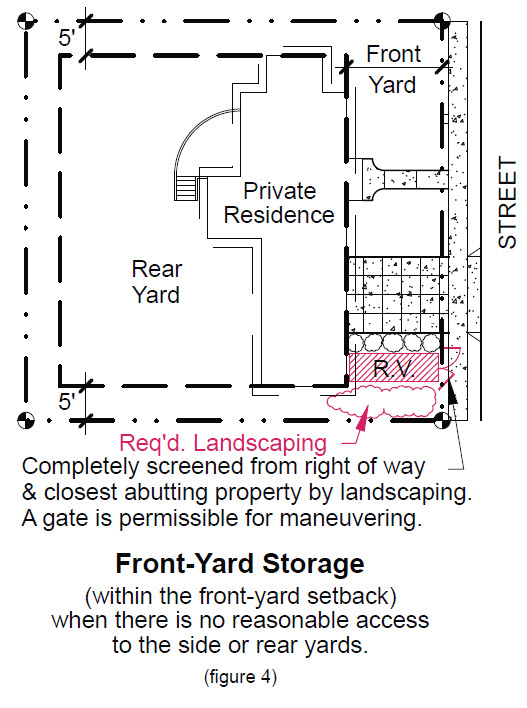
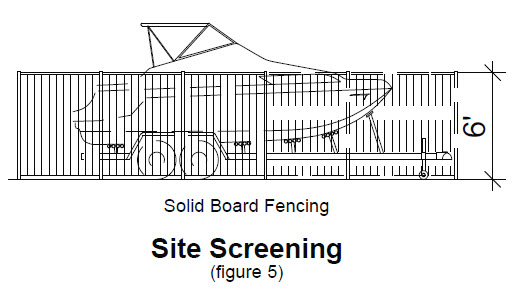
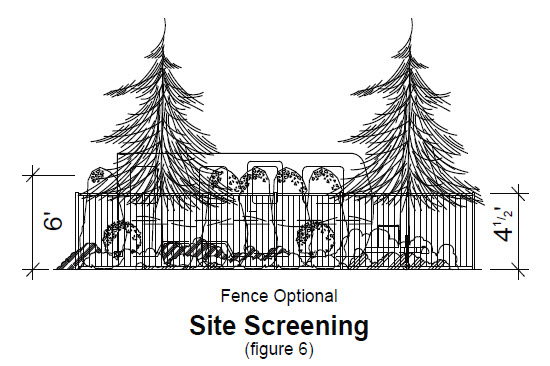
Is storage in the front yard, between the house and road, allowed?
If there is no reasonable access to a rear or side yard, one licensed and operable RV, watercraft or utility trailer not exceeding 28 feet in length may be located in the front yard one of two ways as follows:
- Outside the front setback
- It is located outside of the front setback required for the zone.
- It is parked in the driveway, perpendicular to the right-of-way
- It is sight-screened from the closest abutting property by solid board fencing or sight obscuring landscaping at least six feet in height
- Within the front setback
- It is located within the front setback required for the zone.
- It is completely sight-screened from the right-of-way and the closest abutting property. The sight-screening must consist of plant material; however, a gate is permissible if necessary for maneuvering.
Notes:
- All sides of a property which abut a right-of-way are considered to be front yards.
- Where there is an elevation difference between properties, a fence located along the property line does not necessarily meet the screening requirement.
Screening and Slopes
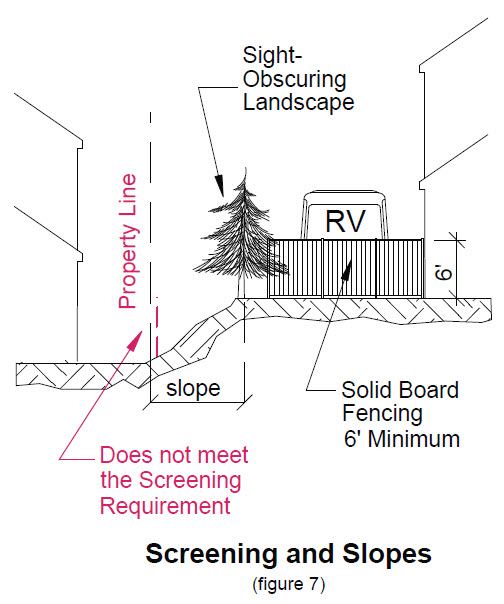
Can an RV be used as a dwelling?
One RV may be used as a temporary dwelling on a lot already containing another dwelling unit. It may be used for up to five days without a permit and up to 30 days upon issuance of a temporary use permit, subject to the following:
- The permit must be affixed to the RV in a manner that it is prominently displayed and visible, to the extent possible, from a public right of way.
- RVs allowed as a temporary dwelling may be parked within a front yard, need not be sight-screened, and need not comply with accessory structure setback requirements for the effective period of the permit.
- No more than one temporary use permit may be granted within any three-month period.
Are there exceptions to the storage and screening requirements?
- During loading and unloading of an RV, watercraft or utility trailer, the requirements do not apply, provided that the loading/unloading is completed within a three-day period within any two-week period.
- During temporary use of an RV as a dwelling, the screening and setback requirements do not apply.
- Vehicles with camper shells and watercraft moored over water are exempt from the requirements.
Are there allowances for qualified disabled RV owners?
Yes. One RV per residence is exempt from the location and screening requirements if at least one occupant of the residence has a current windshield placard or special license plate issued to him/her by the State of Washington as a qualified disabled person in accordance with RCW 46.16.381. Persons claiming this exemption must apply to the Director of Development Services for approval.
What if I want to store it closer to the property line?
An RV, watercraft, or utility trailer can be located up to the side or rear property line if a written mutual agreement of the affected abutting property owners is recorded and other requirements are met. See Land Use Code (LUC) 20.20.125
What type of plant materials are acceptable?
Plants that are well-foliaged from the ground up and can provide a dense screen. Remember that plant spacing, height at time of planting, and ongoing care and maintenance are necessary considerations.
Is charging others a fee for storage allowed?
No. Storage of RVs, watercraft or trailers for compensation is not permitted in a residential land use district. Storage facilities provided exclusively for tenants of multifamily dwelling complexes are allowed.
Where can I get additional information?
- LUC 20.20.720 Recreational Vehicles, Watercraft, and Utility Trailers
- LUC 20.30M Temporary Use Permit